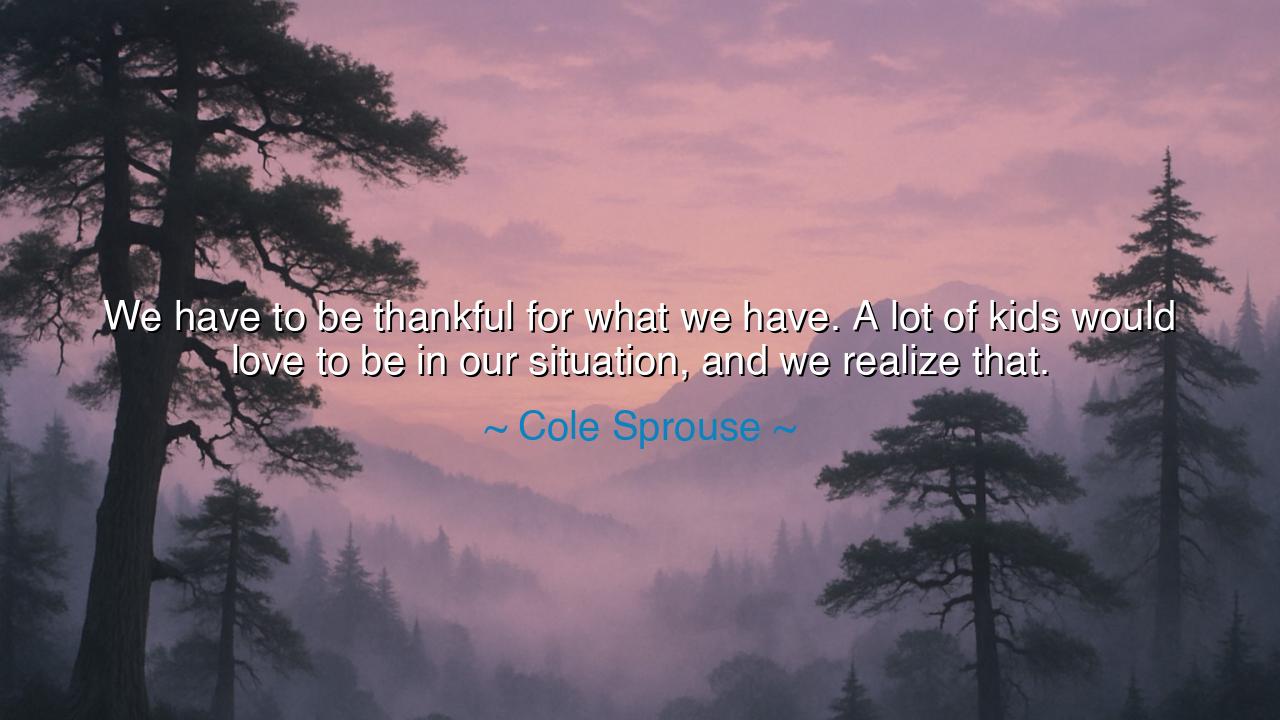
We have to be thankful for what we have. A lot of kids would
We have to be thankful for what we have. A lot of kids would love to be in our situation, and we realize that.






In the words of Cole Sprouse, we hear the wisdom of remembrance: “We have to be thankful for what we have. A lot of kids would love to be in our situation, and we realize that.” This is not the boast of privilege, but the humility of recognition. To be thankful for what we have is to stand upon the ground of reality with eyes open, knowing that fortune is not evenly shared, and that many long for what we ourselves may take for granted. Gratitude, then, becomes not only a private sentiment, but a sacred responsibility.
The situation of which he speaks is one of opportunity, of visibility, of success in a world where countless others strive but do not attain. Sprouse reminds us that to be placed in such a position is not merely luck, but also stewardship. To recognize that “a lot of kids would love to be in our situation” is to awaken to the truth that blessings are not given to be wasted. It is to see clearly that our place could have been another’s, and thus we must live with both gratitude and honor.
This ancient truth resounds through history. Consider the tale of Alexander the Great, who was tutored by Aristotle, given an education that few in his world could ever dream of. Many children of his time toiled without learning, without guidance, without opportunity. Yet Alexander recognized the weight of what he had been given, declaring, “I am indebted to my father for living, but to my teacher for living well.” His awareness of privilege fueled his destiny, just as Sprouse’s words remind us that the realization of advantage must lead to humility and purpose.
There is also here a quiet rebuke against ingratitude. For how often do men and women, blessed with comfort and opportunity, cry out as if abandoned, forgetting the countless souls who endure far harsher trials? The ancients called this forgetfulness hubris, the arrogance of those who cannot see beyond their own desires. Sprouse’s words cut through this blindness, calling us back to the vision of what we already possess, and to the discipline of thankfulness.
His reminder also speaks to empathy. To realize that others would long for what we have is to step outside the self, to imagine the yearning of those who watch from the shadows. It is to remember the child who hungers for opportunity, the laborer who dreams of rest, the artist who never receives a stage. Gratitude deepens when it is paired with empathy, for then it is not only about what I have, but about what others long for, and how I may use my blessings to uplift them.
From this, the lesson for us is clear: be thankful for what you have, not only in words, but in action. Gratitude must be more than sentiment—it must shape how we live, how we treat others, how we steward the opportunities placed before us. To forget gratitude is to squander blessing; to live with gratitude is to turn blessing into legacy.
Practically, let each of us take inventory of our lives. Write down what you possess—your opportunities, your freedoms, your relationships—and then ask: How many would love to be in my situation? Let that realization move you first to humility, and then to generosity. Use what you have not only for yourself, but to extend hope to others, that they too may rise.
Thus the words of Cole Sprouse endure like a quiet hymn: “We have to be thankful for what we have.” In this recognition lies the antidote to arrogance, the seed of empathy, and the path to true greatness. For when we live with gratitude, we not only honor our own blessings, but also open the way for others to share in them—and in that sharing, the circle of humanity is strengthened, generation to generation.






AAdministratorAdministrator
Welcome, honored guests. Please leave a comment, we will respond soon